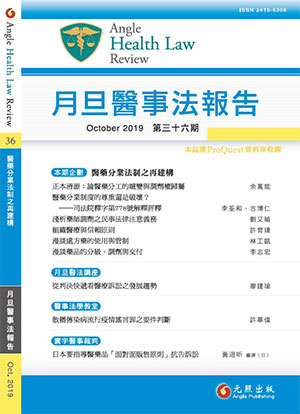醫藥分業制度的尊重還是破壞?──司法院釋字第778號解釋評釋【本期企劃】 試閱
Maintaining the Policy of “Separation of Dispensing Practice from Medical Practice” or Destroying It? — A Commentary on the J.Y. Interpretation No. 778
司法院釋字第778號解釋肯認藥事法第102條第2項規定之「醫療急迫情形」得為醫藥分業政策下醫師例外享有藥品調劑權之依據,惟以增加對其之要件限制違反法律保留為由,宣告藥事法施行細則第50條與衛生福利部食品藥物管理署2011年4月12日FDA藥字第1000017608號函違憲。本文嘗試以整體醫事法規(包含醫師法、緊急醫療救護法等)進行觀察後發現,多數意見認為上述命令恐造成民眾健康保護漏洞之疑慮應不存在,本號解釋之結論反可能造成醫藥分業制度之破壞。
J.Y. Interpretation No. 778 recognizes that “in the case of urgent need of medical treatment services,” stipulated in Article 102, paragraph 2 of the Pharmaceutical Affairs Act, provides the legal basis for physicians’ right of dispensing under the separation of dispensing practice from medical practice policy. However, it declares Article 50 of the Pharmaceutical Affairs Act Enforcement Rules and the Letter of No. 1000017608 issued by Taiwan Food and Drug Administration in April 12th, 2011 unconstitutional because both of them additionally impose restrictions on the application of the foregoing requirement “in the case of urgent need of medical treatment services” beyond statutory scheme, and therefore violate the principle of Statutory Reservation (Gesetzesvorbehalt). After observing the legal framework for medical regulations as a whole (including the Physicians Act, Emergency Medical Services Act, etc.), this article finds that the majority’s concern about that those ordinances may cause public health protection loopholes does not exist. As a result, J.Y. Interpretation No. 778 may rather destroy the separation of dispensing practice from medical practice policy than maintain it.
020-034






